Moving is stressful enough, but many report negative experiences with professional movers due to rising costs and tipping fatigue
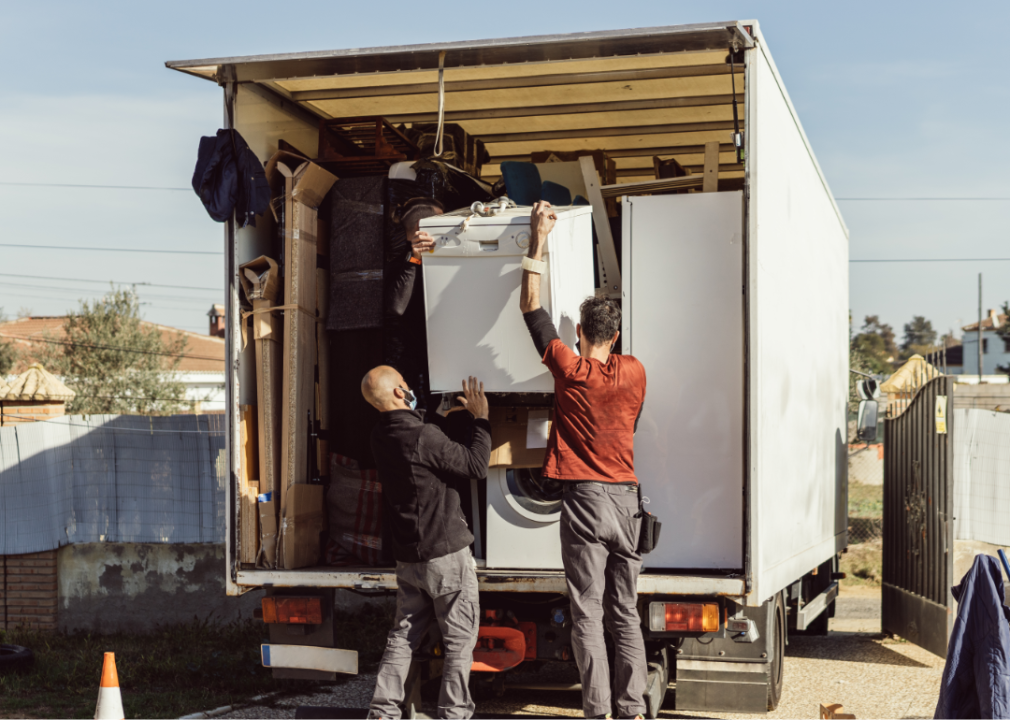
Moving is stressful enough, but many report negative experiences with professional movers due to rising costs and tipping fatigue
Moving into a new home can be as anxiety-producing as other big life stressors, such as divorce or having kids. Movers can help minimize some of this stress by offering packing services, providing large trucks and lifting heavy furniture. But this convenience comes at a price, and many think it’s too high.
ConsumerAffairs surveyed 1,000 Americans who used movers for all or part of their move in the past three years and found that many had negative experiences despite paying more than they budgeted.
![]()
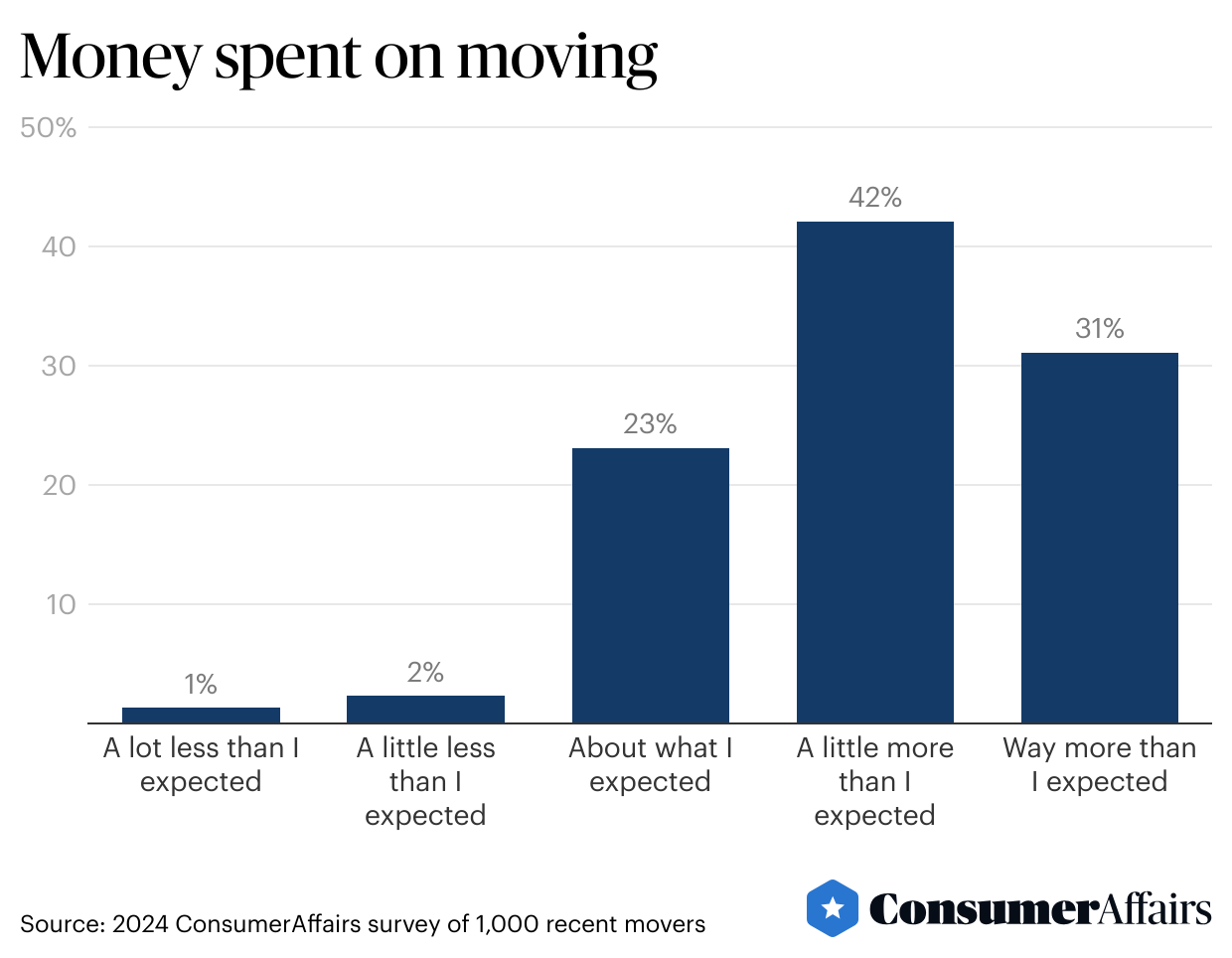
Moving more expensive than expected
About 73% of respondents said their recent move was more expensive than expected — and about 54% said it was more stressful than they anticipated.
The expectation of tipping could be causing some tension, as more than a quarter of respondents said they felt a lot of pressure to tip their movers even if the quality of service was low. Thirty-three percent said they felt a little bit of pressure and only 39% said they felt no pressure.
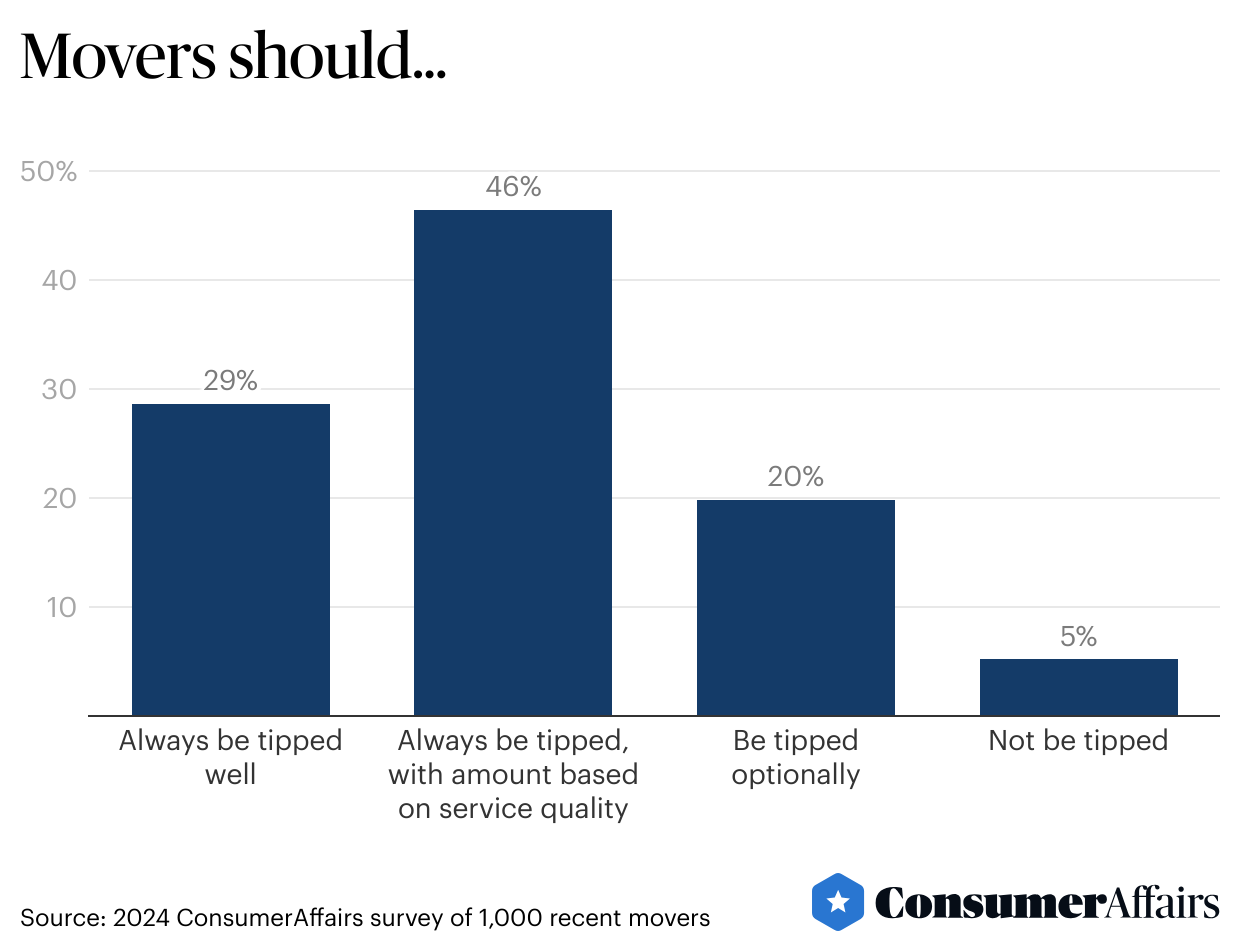
Increased pressure to leave a gratuity has left many feeling tipping fatigue
Tipping fatigue has become common across many industries, as more businesses — from dry cleaners to coffee shops — have added an option for people to leave gratuity. About two-thirds (65%) of those surveyed by ConsumerAffairs say they’ve noticed increased pressure to tip across all industries in 2024, and 35% say they’re concerned about it.
One survey respondent from West Covina, California, had to borrow money from family and friends to pay for their recent move and said he felt pressure to tip despite receiving poor service. He said he had items lost and damaged and experienced a lack of professionalism during the move. He ultimately wound up tipping less than 10%.
A moving company customer from Le Roy, Illinois, said in the survey she believed the service she paid for was too costly and didn’t tip.
“I feel that it was too much and that it should have been a whole lot cheaper,” she said. “I have actually moved myself cheaper than a moving company can move me.”
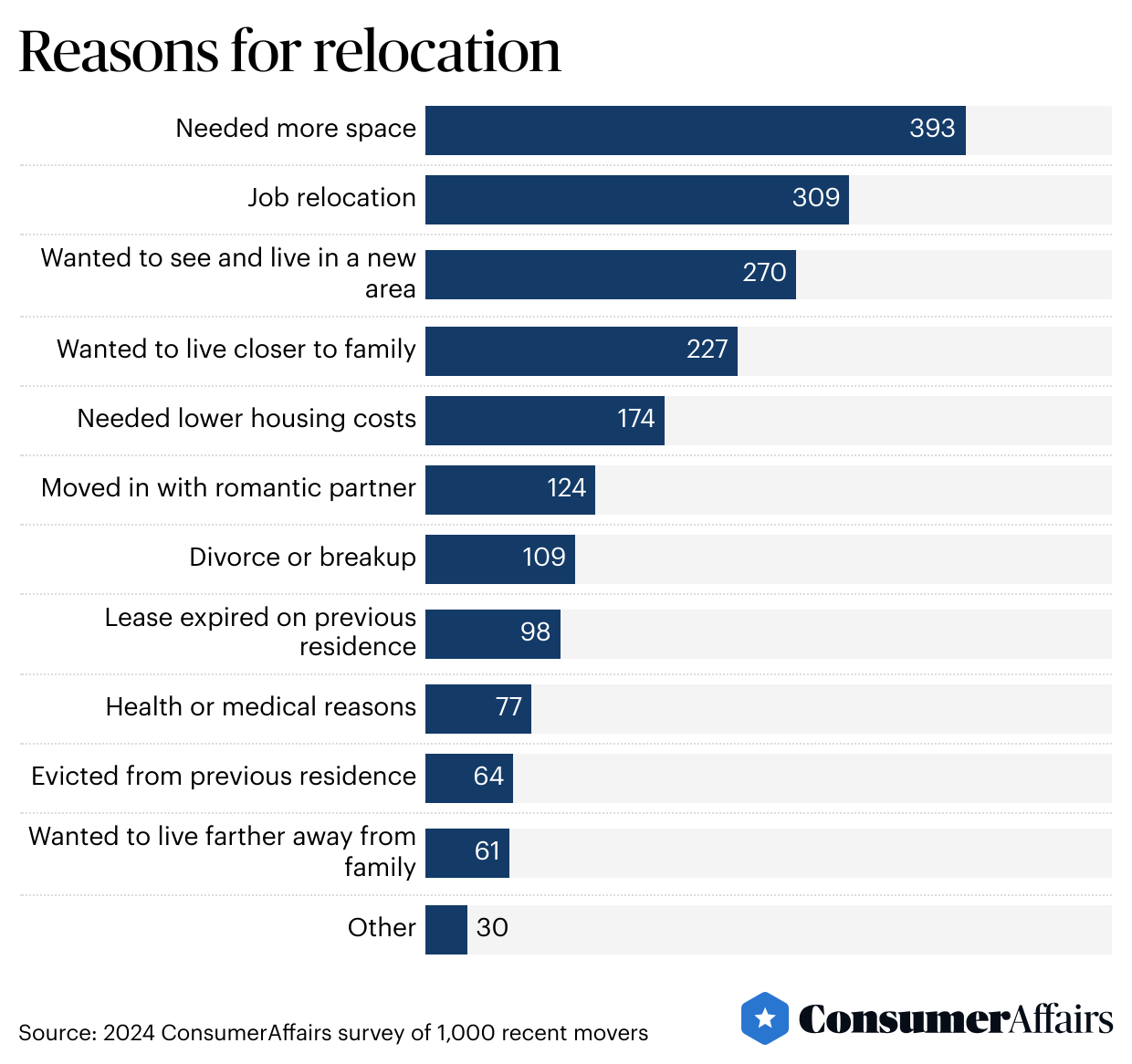
Why Americans are moving
The number of Americans who choose to relocate has been trending downward in recent years. Roughly 16.8% of Americans reported moving somewhere new over the past year in 2006, and that number has continued to fall since, according to the U.S. Census Bureau. In 2022, 12.6% of Americans reported moving in the past year.
The ConsumerAffairs survey revealed the biggest reasons people are relocating. About 40% said they needed more space, 31% said they relocated for a job relocation, and 27% wanted to experience life in a new area.
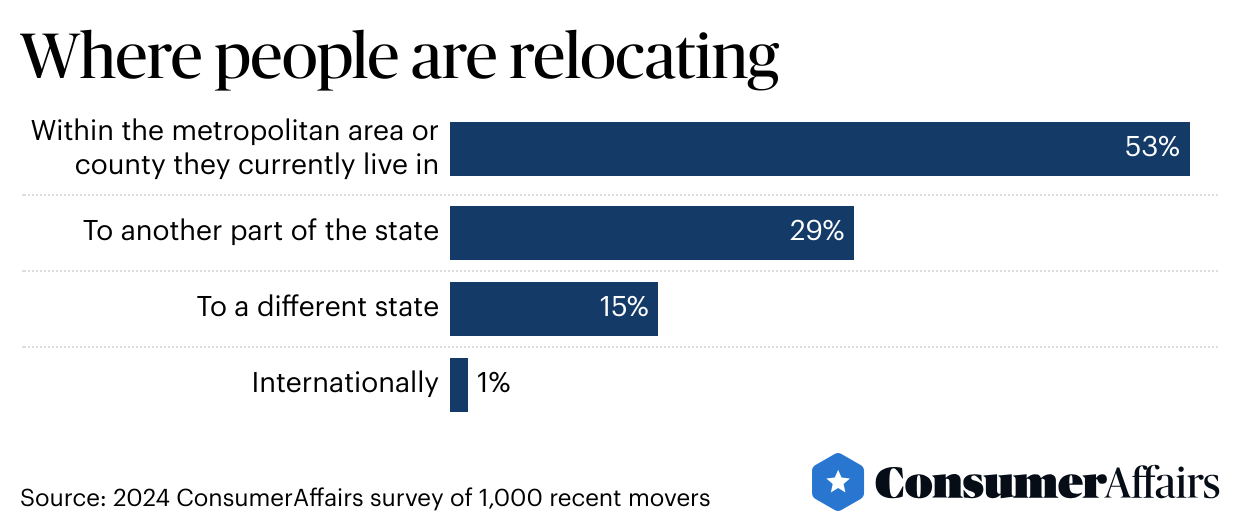
More than half of people staying close to home
The survey found that most people stayed fairly close to their existing home: Over half (53%) moved within the same metro area or county. Approximately 30% moved to a different part of the state, and the rest moved out of state or internationally.
The cost of hiring movers can vary greatly depending on how far you’re going and how much you’re taking with you, but most people are in agreement: Moving is more expensive than they expected.
Roughly 73% of ConsumerAffairs survey respondents said their final bill exceeded their pre-moving expectations, and 25% felt they were overcharged.
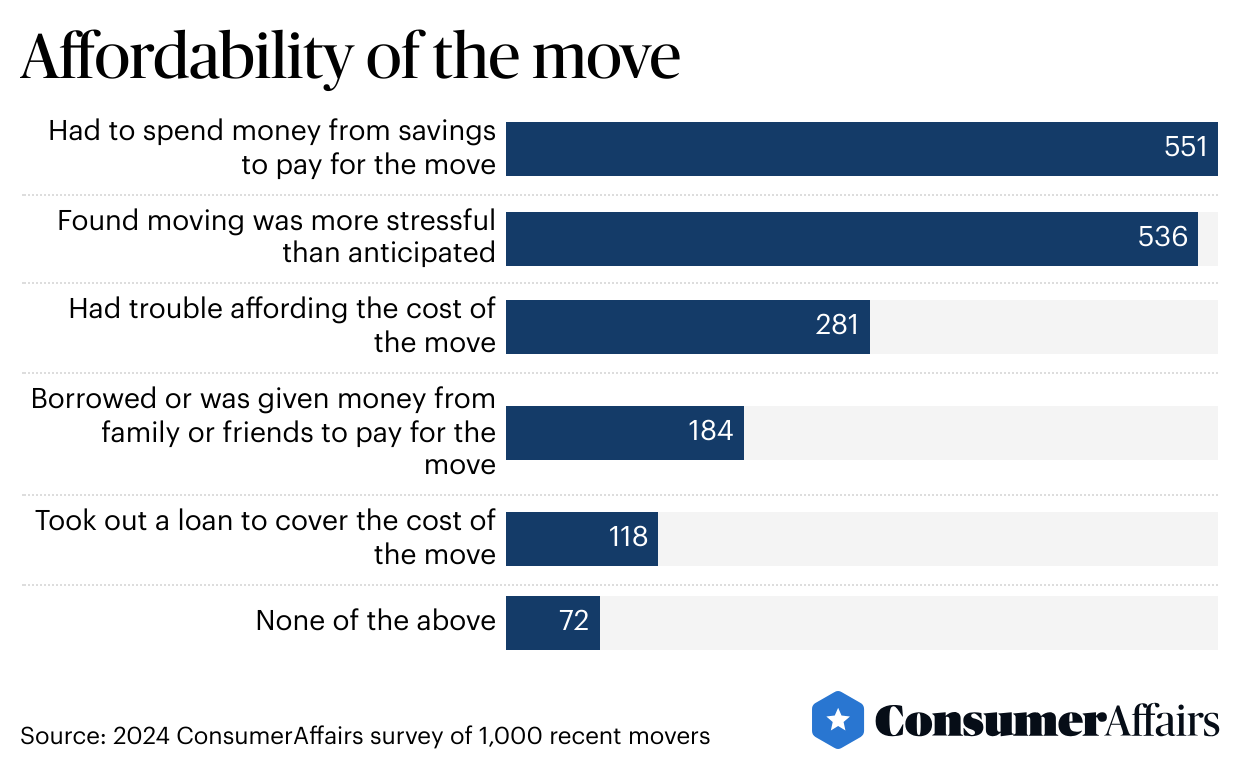
From borrowing money to taking out loans to pay movers – moving can be expensive
High costs have made it difficult for some people to afford to relocate. Over half (55%) of survey respondents had to use their savings to pay the bill. About 18% had to borrow money from family or friends, and 12% had to take out a loan to help cover the expenses.
How should you approach tipping movers?
Elliot Helm, the owner of Sterling Interstate, a small moving company in Phoenix, said tipping is never expected, but it’s always appreciated.
“A really cool day would be if they tipped us $20 to $50 each,” said Helm. “Even during a really long day, just ordering lunch is a really kind gesture.”
About 77% of respondents to the survey said they have a good idea of tipping expectations and what is a fair amount to give. About 20% said they weren’t sure how much to tip.
There are no set rules for tipping movers, experts say. According to the survey, most people think tipping $5 to $10 per hour per mover is just right. A plurality of those surveyed (34%) left a 10% to 15% tip at the end of their move.
Then there’s the 3% of people surveyed who said they would never tip a moving company for its service.
“Tips are generally based on the size and complexity of the move and should be paid upon satisfaction,” according to Morales at International Van Lines.
The moving company recommends leaving $25 per mover if you are moving a one-bedroom home, $35 per mover for a two-bedroom home, $45 per mover for a three-bedroom home, and $50 to $60 per mover for a four- or five-bedroom home.
“Most movers only get paid when they’re working,” Morales said. “The average pay is $200 per day, regardless of how much work is involved and how complex the move is. Moving is backbreaking work, so although tips aren’t mandatory, they’re appreciated.”
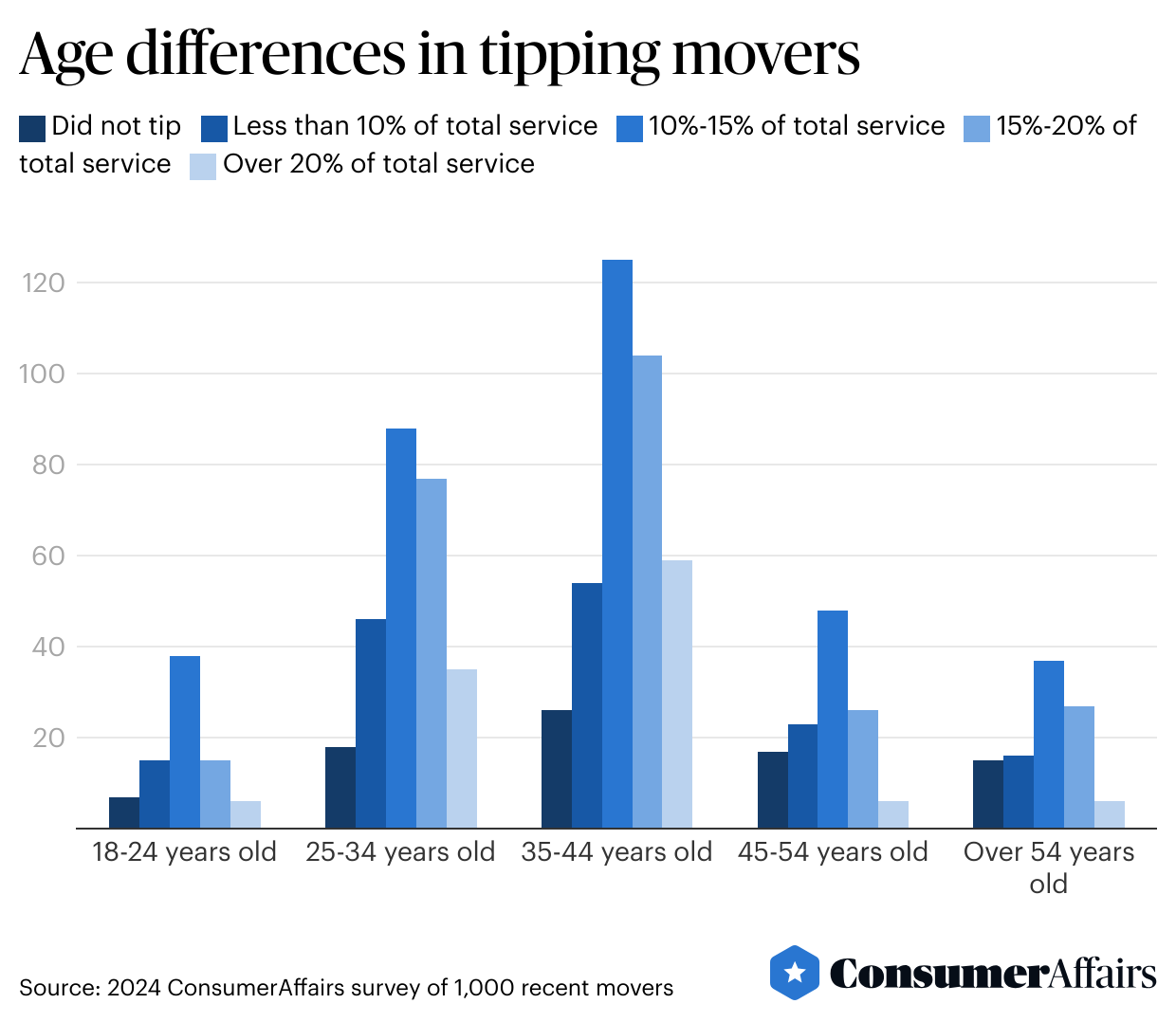
Your age could determine how much you tip
Tipping preferences can change depending on gender and generational differences. Those 35 to 44 were most likely to tip movers over 20%.
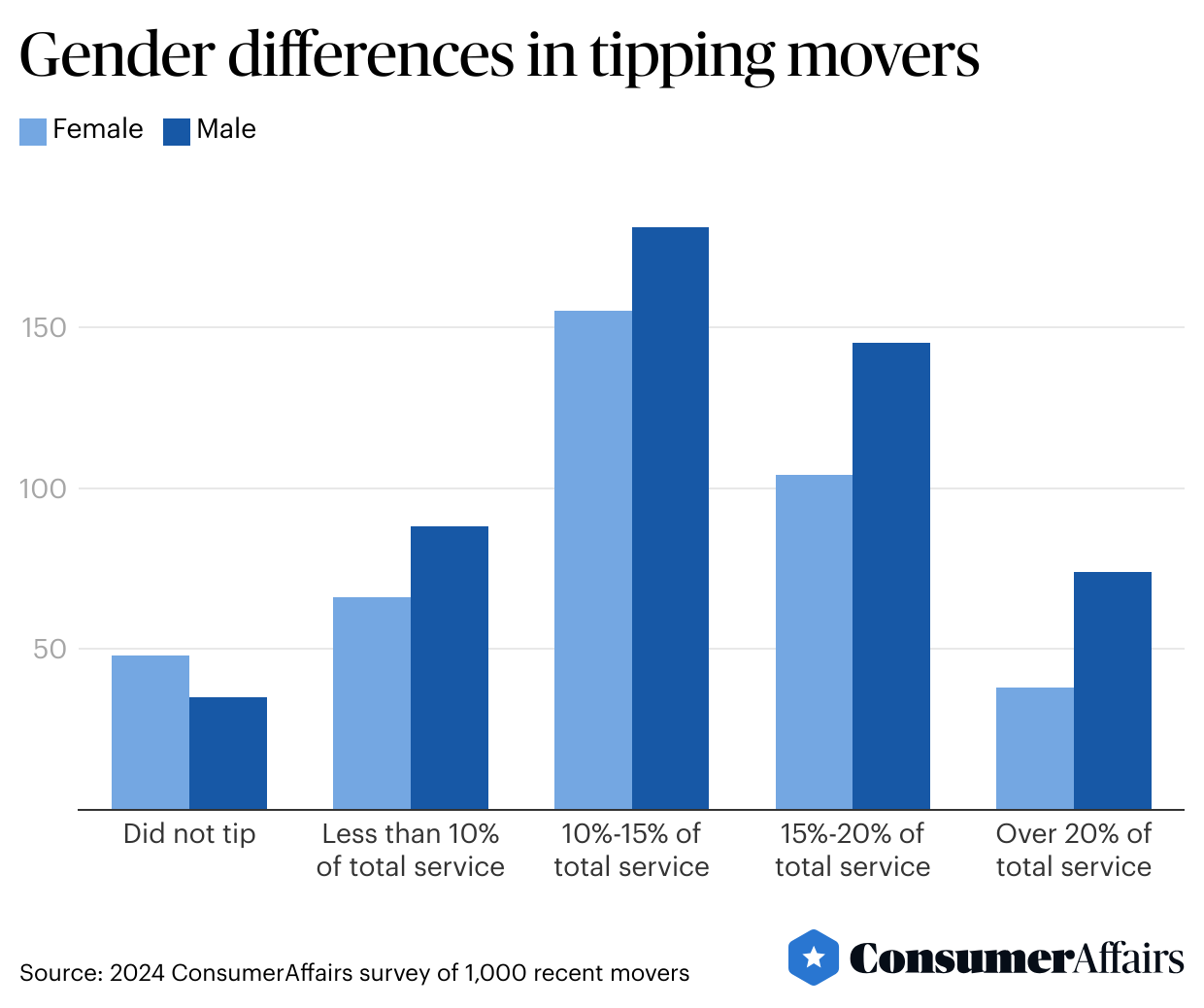
Factors that influence tipping
ConsumerAffairs also found that men were more likely to leave a tip of 20% or higher than women.
But gender and age are just a few factors. People are most likely to tip extra if movers provide exceptional service, move heavy or fragile items or work during inclement weather, ConsumerAffairs found.
Morales from International American Van Lines says the complexity of the job should always be considered.
“Resist withholding your tip due to unforeseen circumstances, such as traffic, adverse weather or equipment issues that are beyond the team’s control,” Morales said. “Just as you wouldn’t skip tipping your waitress if a restaurant runs out of your favorite dessert, the same applies to your movers.”
Nearly half of those surveyed (46%) think movers should always get a tip after providing service, but they believe the tip amount should be based on the quality of the work.
It isn’t uncommon to face problems during a move. ConsumerAffairs found 36% of survey respondents found broken or damaged items, 24% had delayed deliveries and 19% experienced a lack of courtesy or professionalism from the company they hired.
Federal law requires interstate movers to cover lost or damaged goods, while each state has its own rules for intrastate movers. In some cases, you may want to explore additional coverage, especially for valuable items.
Atlas Van Lines, one of the largest moving companies in the U.S., recommends customers “consider companies that offer protection for your valuable items.
“This is a cost-effective option that gives peace of mind to customers, knowing that in the rare circumstance that an item goes missing, sustains damage or is rendered unusable, the repair or replacement is covered,” the company said.
Keeping a checklist for your move helps with organization, like remembering to take photos of belongings before packing them up and keeping a detailed inventory list to ensure everything is accounted for at the end of a move.
Lowering your moving costs
North American Van Lines says there are many things people can do to lower moving costs. The biggest advice it offers is to declutter before the big day and not wait until the last minute to get organized.
“Moving expenses are calculated according to the weight and volume of items; thus, the more stuff you have, the more you’ll have to pay to get everything to your new home,” said Ryan Cox, the director of marketing at North American Van Lines.
“Consider disassembling furniture ahead of time,” Cox added. “While movers can help with furniture disassembly, it’s a time-consuming task that can add to your invoice.”
“Moving can be expensive, especially out of state and overseas,” said Josh Morales, the president of International Van Lines, a full-service moving company that does over 20,000 moves per year.
“Moving is a great time to purge and reduce the amount of stuff you’re moving, which will reduce the moving cost,” Morales said. “Additionally, things like self-packing and being flexible on moving dates can help.”
One way to cut costs is for consumers to do some of the heavy lifting themselves. Of the 1,000 people surveyed by ConsumerAffairs, 53% hired movers to handle their entire move, while the rest (47%) used professionals for only part of the move.
Another option is to move during the winter, when costs are typically cheaper. Morales stated that the peak moving season is between May and August. During these months, rates can increase by an additional 25% on average.
International Van Lines says it’s also vital that customers communicate clearly with their moving company before moving day. Movers should have advance notice about special handling requests, storage, difficult access areas and stairs.
“A lack of communication can lead to issues with packing, delivery dates and the final invoice,” Morales said.
Industry experts say it’s important to do your due diligence to find the best moving company. Researching reviews from previous customers and asking for recommendations can give you a big advantage. You can also visit the Federal Motor Carrier Safety Administration’s website to verify if a company is registered as an interstate mover and review complaint history.
While most companies offer similar packing and moving services, you can have a different experience based on which you choose to hire.
“You want to hire a company that’s going to take care of your items because it’s literally your life that you’ve been accumulating,” said Helm of Sterling Interstate. “Just because something doesn’t have a lot of monetary value, that doesn’t mean it’s not valuable. You can’t put a price on heirlooms.”
Methodology
ConsumerAffairs surveyed 1,000 American adults who had relocated within the past three years and used a moving service for some or all of their moves. Respondents were asked 15 questions about moving distance, moving expenses and attitudes around moving and tipping. ConsumerAffairs used the Pollfish survey platform to conduct the poll on March 18, 2024. The margin of error for the survey is 4%.
This story was produced by ConsumerAffairs and reviewed and distributed by Stacker Media.
Provided by Stacker



